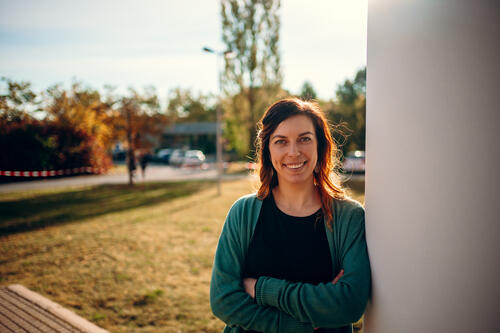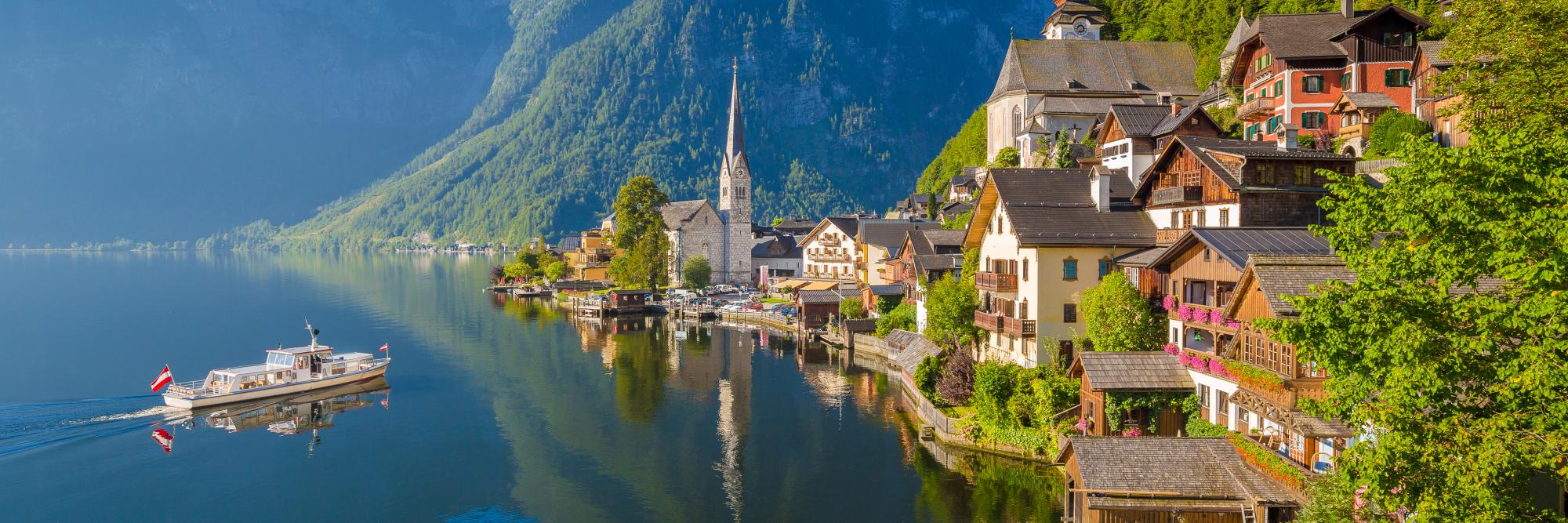Mariëtte is a sunny South African girl trying to navigate her way around mountainous Austria. You can follow her experiences in Villach, Austria on Twitter or Instagram.
For more on expat life, see our Expat Arrivals essential guide, Moving to Austria.
About Mariëtte
Q: Where are you originally from?
A: I am originally from Johannesburg, Florida Park area.
Q: Where are you currently living?
A: Currently I am living in Villach, Austria.
Q: When did you move here?
A: I moved beginning of September 2021.
Q: Is this your first expat experience?
A: Yes.
Q: Did you move to Villach alone or with a spouse/family?
A: I moved alone – my brother and sister-in-law live in Linz, but I made the move on my own.
Q: Reason for moving?
A: I wanted to experience living in a completely new/different country for more than just a few weeks or days.
Living in Austria
Q: What do you enjoy most about Villach and Austria in general?
A: Villach in general is a town where people will greet you on your morning walk, offer you a lift home when you are carrying a lot of stuff, and try as much as they can to help you find your way (even if it is all in German – or rather Kärntnerisch, an Austro-Bavarian dialect). It is also situated 20 minutes from Slovenia and Italy, so a midweek dinner in one of these countries is not strange.
Q: Have you had any low points? What do you miss most about home?
A: Of course I have had low points! I try not to think too much about these because as an expat if you go down this rabbit hole you will most probably see only the bad and realise they sometimes outweigh the good. I won’t sugar-coat it, moving abroad is hard. There are days when you ask yourself why you did this, but as soon as you step outside your house and can walk with your cell phone in your hand without the fear that someone will snatch it, you know that the move was worth it. I do miss my parents and friends a lot. I also miss Lexi’s and Kaylee’s – which are my two favourite South African restaurants.
Q: What are the biggest adjustments you had to make when settling into expat life in Villach? Did you experience culture shock at all?
A: I was quite ready to experience culture shock, so I think it didn’t hit me as much. The language is a bit of a struggle, seeing that you learn Hochdeutsch (standard German) and then I ended up in a town that speaks an intense dialect – but it makes life interesting! There is of course the rule of not crossing a street unless it’s via a zebra crossing, and you have to wait for the green light to go. One thing that did surprise me is the smoking culture. I would see people taking a smoke break from their 100km bicycle training session or pregnant women walking around smoking. It’s also interesting how people in Austria are extremely aware of recycling and sorting their garbage into different bins, yet throw their cigarette butts on the floor. One big thing to keep in mind here if you are used to someone cleaning your apartment is that you will have to clean your apartments yourself (you can pay someone but in South African terms it costs way more), you will have to take care of your own garden, and in general, anything to do with manual labour you will most likely have to do on your own or pay a lot of money to get done.
Q: What are your favourite things to do on the weekend? Any particular places or experiences you’d recommend to fellow expats?
A: Because the Alps are all around me, I love going hiking and spending time in nature during the weekends. There are also a lot of beautiful lakes around me. I love spending time there with my friends during weekends. Going to Italy or Slovenia for a day trip is also something I would recommend people do!
Q: What’s the cost of living compared to home? Is there anything especially expensive or cheap in Austria?
A: Nothing is really cheaper here. Austria in general is one of the more expensive countries in Europe. There are a lot of products and things that are about the same price as in South Africa. Something that is more expensive is rent and anything that includes manual labour.
Q: What’s public transport like in Villach and across Austria?
A: In the bigger Austrian cities, public transport is amazing. You can find trams, underground trains, buses, electric buses, and even free-standing e-scooters. These e-scooters are really cool! They are just randomly in the city, and you unlock them by scanning the QR code and then it’s ready to go. If you’ve reached your destination, you park and lock it – done! You pay for your distance through the app. In Villach, the public transport is not as extensive, seeing that it is a smaller town, so there are only buses here.
Q: What do you think about the healthcare available in Austria? What should expats expect of local doctors and hospitals?
A: The healthcare system is amazing! One thing to keep in mind is that if you use government healthcare (because they also have private healthcare here, but only a small percentage have that) is that you always have to go to your GP first. They have to then refer you to a physiotherapist, radiologist, etc. Then you can go to the specialist and not pay, seeing that it was recommended. But if you just do a walk-in at a specialist, you will pay a lot!
Q: What’s the standard of housing like in Villach? What different options are available?
A: It’s pretty 'normal' in the sense that there are apartments, flats, condos, houses, etc. They are however a lot smaller than in South Africa, and you would pay a lot more comparatively. Also, keep in mind that when they talk about a three-room apartment they literally mean there are three rooms, not three bedrooms!
Q: Any areas or suburbs you’d recommend for expats to live in?
A: I can recommend any area in Villach to live in. If you want to live close to or in the city centre, the apartments will be smaller, but as you move away from the centre you can start looking at smaller houses, and then, of course, there are also bigger houses.
Meeting people and making friends
Q: Was meeting people and making friends easy? How did you go about meeting new people?
A: I am studying and working here. Studying helped me a lot to meet people. The environment just lends itself to it. These were mainly other expats as well. There is also an amazing organisation in Villach called the Carinthian International Center that expats can join and meet other expats. They also offer workshops and German courses to help you adapt to the country and town.
Q: Have you made friends with locals or do you mix mainly with other expats? What advice would you give to new expats looking to make friends with the locals?
A: I have made friends with some local people, but it is definitely more difficult than forming friendships with other expats. Keep in mind that if you lived in your country of birth you probably have your group of friends from school or university, and foreigners rarely join the group. It is the same situation here. The locals I have made friends with are generally those interested in other cultures, people who have lived abroad, or people who speak a decent amount of English. I have a lot of local acquaintances as well. My advice would be to start learning the language, find an activity you like and join a local group. Then you can practice the language with them and understand the culture. You do not have to be fluent at all – a few sentences will be enough – but show the local people that you want to learn their language, and they will really appreciate it!
Working in Austria
Q: Was getting a work permit or visa a relatively easy process? Did you tackle the visa process yourself, or did you enlist the services of an immigration consultant?
A: This is the biggest hassle. Mainly because every institution in South Africa has to be verified and legalised. I can write an entire essay on this topic, so it’s best to send me a message or email and ask specific questions. I have an entire list of companies and people who helped me, so I will gladly forward that to anyone in need.
Q: What is the economic climate in Villach like?
A: Booming! If you ask the locals, they will say it’s not as prosperous as it was, but coming from South Africa, it is a land filled with opportunities! You can also see the economic activity in the way the country approaches their buildings. They are always cleaning and maintaining the old, historically seeped architecture whilst expanding the city and building more accommodation for people to live in.
Q: How does the work culture differ from home?
A: There is a massive focus on work-life balance here. If you work more than expected, your managers will have a chat with you to try and understand what’s going on and why you are working so much. This is still a concept I am getting used to, but I quite enjoy it!
Final thoughts
Q: Is there any advice you would like to offer new expat arrivals to Austria?
A: First of all, nothing you do will fully prepare you for what you will experience. Every aspect of your life will change, and it will be amazing! Secondly, get in contact with a South African – they are everywhere and yes, even in small Villach. Bring a few items (Zam-Buk, vanilla essence, photos) from South Africa that will keep you going in times when you get homesick. And lastly, immerse yourself in this new town and experience. It is a privilege that not everyone gets, and you should treat it with gratefulness and appreciation.
►Interviewed September 2022



